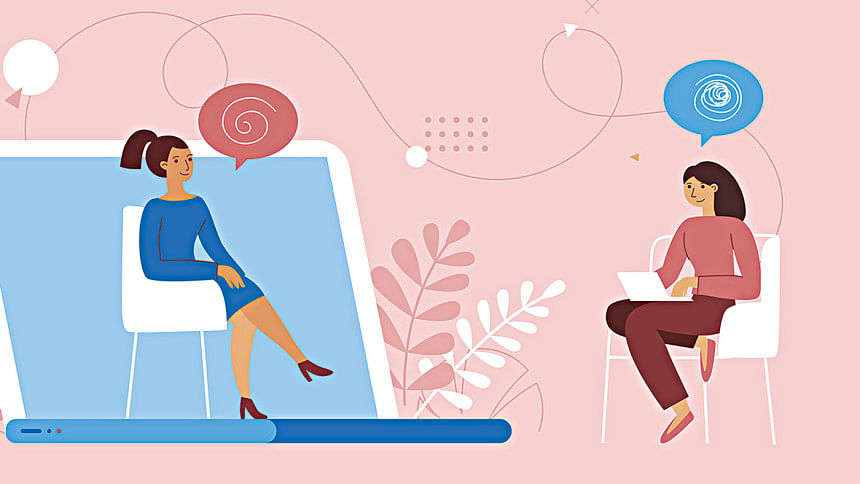Counselling 101

How would you define the concept of counselling?
To put it simply, counselling is the science of talking out our emotions and feelings, and learning the mechanism of dealing with them. To be more precise, it is the process of taking professional help or support to solve or minimise any kind of emotional or psychological issue.
There can be many ways in which we may be in internal turmoil with ourselves, like a mental health condition such as depression or an upsetting physical condition like infertility or cancer. Counselling enables you to share your thoughts without having to bottle them up.
A psychologist/counsellor will listen patiently and empathetically to what you are saying, without any criticism or judgement, keeping everything absolutely confidential. Instead of just telling or imposing the dos and don'ts like any other treatment, your counsellor and you together, will come up with possibilities and ways to address the issue at hand.

What is the difference between counselling and psychotherapy?
Although these two terms are often confused as one, there are some significant differences between the two. These are two different treatment procedure, used according to a person's problem severity and duration. Counselling is somewhat short-term in comparison with psychotherapy.
Counselling focuses on issues like interpersonal and intrapersonal conflict resolve, uplifting depressive moods, enhancing personal and professional performances at hand whereas psychotherapy digs deeper. Psychotherapy, works with intensive and extensive assessments of a person's past and present psychological distress or disorder, and design treatment plan accordingly.
What are the different types of counselling/psychotherapy?
Counselling/Psychotherapy can be required anywhere if there is a need for psychological development for an individual or for a group of people. This is not only for someone who has any mental health issue but also for those who want to enhance their emotional growth and performance in daily life. Some of the most common types of counselling include Family, Marriage, Educational, Rehabilitation, Sports, Substance abuse, Mental health, Bereavement and Career Counselling.
When should a person consult a counsellor/at which stage do you think someone should definitely seek help from a counsellor?
The answer is pretty simple — before it is too late or before the damage has been too much. The minute you realise that you are not feeling okay mentally or there is something that has been bothering you lately, you should immediately talk to someone you trust.
Keeping thoughts to yourself can slowly eat you alive from the inside and even be detrimental. If you feel that you are not comfortable talking about it to anyone or if that the talking is doing you no good, that is when a counsellor steps in.
Remember one thing — seeking professional help is ABSOLUTELY NORMAL. No one is at fault here and thus there is nothing to be ashamed of. There were lots of stigma regarding consulting a counsellor in our society which is decreasing day by day. The longer we let this fear of 'being judged' control us, the longer this 'negative tag' will stay in society. So instead, loosen up and go visit a professional just like you would visit a doctor if you have a fever or stomach-ache.
Just like visiting a doctor too late after experiencing sign and symptoms is dangerous, delay in seeking professional help for your mental health is just as threatening.
In our country, there seems to be a lot of stigma regarding consulting a counsellor. What are your thoughts regarding this matter?
Yes, unfortunately there are lots of stigma regarding this matter and visiting a mental health expert often tags you as a 'madman'. The importance of mental health is gaining its recognition and is being accepted by Bangladeshi society slowly but surely.
What people are failing to see is that mental health is just as crucial as physical health. We often forget that mental health affects physical health as well. This is also one of the most circulated messages during COVID-19 pandemic.

Thus, the only way this matter can be made more normal is to raise awareness on this topic, normalise this issue by giving platform to share thoughts with family and friends. There is absolutely no other alternative. Besides, people need to be educated on mental health — what it is, why it is so important, what are some of the direst consequences of neglecting it, when to visit professionals etc.
It is high time people are enlightened about this topic.
What are some of the concerns people may have regarding their very first counselling session?
As it is the very first session in someone's life, it is normal to be nervous. This is one kind of meeting never experienced before, so being a bit hesitant is understandable. You may feel anxious of being judged or criticised by the counsellor. You may be sceptical about disclosing some very secret emotions and thoughts to a complete stranger.
But you need not worry. A therapeutic relationship between you and your counsellor is entirely professional. Whatever you tell your counsellor, it stays between the two of you. Everything is kept absolutely confidential within the corners of that room. No one else will ever have access to any of the information you shared.
In this therapy journey, you will find a non-judgmental environment where you can ventilate your emotions. Your counsellor will not tell you if you are right or wrong. They will simply try to understand your views empathetically without imposing unlimited suggestions. You do not need to 'filter' any answers and can speak your mind completely. Your counsellor and you will plan an achievable goal to deal with your issues in a more manageable way.
Photo: Collected

 For all latest news, follow The Daily Star's Google News channel.
For all latest news, follow The Daily Star's Google News channel. 



Comments